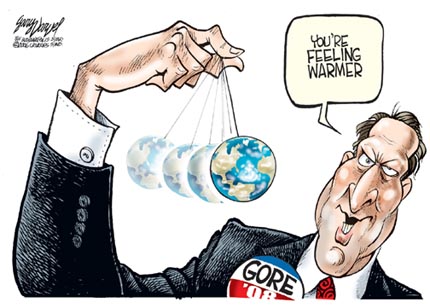By Valerie Richardson • The Washington Times
Al Gore has been accused of hypocrisy for talking the talk on climate change despite burning through fossil fuels at a rapid clip, but it turns out he’s not alone.
A study by Cornell and the University of Michigan researchers found that those “highly concerned” about climate change were less likely to engage in recycling and other eco-friendly behaviors than global-warming skeptics.
Published in the April edition of the Journal of Environmental Psychology, the one-year study broke 600 participants into three groups based on their level of concern about climate change: “highly concerned,” “cautiously worried,” and “skeptical.”
The “highly concerned” cluster was “most supportive of government climate policies, but least likely to report individual-level actions, whereas the ‘Skeptical’ opposed policy solutions but were most likely to report engaging in individual-level pro-environmental behaviors,” the researchers concluded.
Conducting the study, entitled “Believing in climate change but not behaving sustainably,” were Cornell assistant professor Neil A. Lewis Jr. and University of Michigan researchers Michael P. Hall and Phoebe C. Ellsworth.
The skeptics were the more likely than the “highly concerned” to recycle, use public transportation and reusable shopping bags, and buy eco-friendly products.
“Belief in climate change predicted support for government policies to combat climate change, but did not generally translate to individual-level, self-reported pro-environmental behavior,” said the paper.
Why? Even the researchers were stumped, although it’s possible that skeptics may place more emphasis on personal responsibility than government action.
“These results suggest that different groups may prefer different strategies for addressing climate change,” said the paper. “Thus, belief in climate change does not appear to be a necessary or sufficient condition for pro-environmental behavior, indicating that changing skeptical Americans’ minds need not be a top priority for climate policymakers.”
As Pacific Standard’s Tom Jacobs put it, “remember that conservatism prizes individual action over collective efforts.”
“So while they may assert disbelief in order to stave off coercive (in their view) actions by the government, many could take pride in doing what they can do on a personal basis,” he said in a Friday post.
Mr. Gore, a leading climate-change activist, has long come under fire for his carbon-emitting ways, such as burning 21 times more kilowatt hours annually at his Nashville mansion than the average U.S. household, according to a 2017 study by the National Center for Public Policy Research.
His swimming pool alone uses enough electricity to power six average homes for a year, the study said.
Mr. Gore told CNN last year that he leads a “carbon-free lifestyle to the maximum extent possible,” pointing out that he doesn’t own a private jet and that he buys carbon offsets to balance his home and flights on Southwest Airlines.

